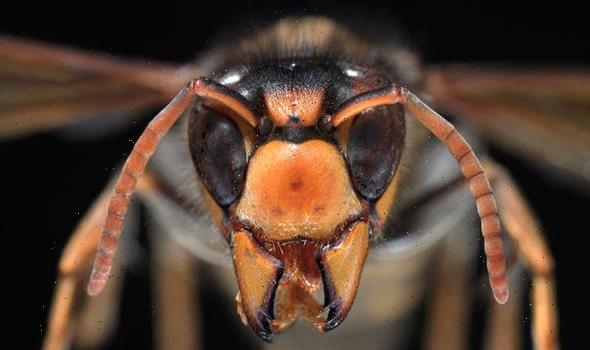DEADLY Asian hornets are set to invade Britain in just days by hiding in unsuspecting holidaymakers' suitcases.
The swarm-ageddon of giant insects is poised to cross the English Channel in the luggage – and even the car boots – of families returning home from Europe after the school holidays.
Last year there was a respite from the Asian hornet threat thanks to Covid lockdown.
But with travel opening up again this summer, and many families crossing the Channel into the continent for their holidays, the beasts are ready to stow away and reach Blighty.
Warning posters have been put up by the Asian Hornet Action Team in Devon, Cornwall and Dorset, where nests have been found since 2018, urging the public to watch out for the insects – whose stings have killed at least five people in France.
The placards are being plastered around caravan parks, marinas and parish noticeboards asking people to check boats and vehicles on their return from abroad.
A spokesperson said today: "Unsuspecting travellers could be bringing hidden Asian hornets into Britain in their vehicles and luggage, thus inadvertently releasing queen hornets that will hibernate and establish new nests here next spring."
The queen hornets, which lay the eggs, hide in sheltered spots on the continent to hibernate.
Unfortunately, this includes trucks, cars, boats and caravans, and as holiday traffic picks up again, some are likely to smuggle their way into Britain.
Hundreds of traps are being laid to nab the nest-making queens in gardens, hedges and fields in the Channel Islands with the hope that taking out the matriarchs will halt the yellow and black-striped terror's invasion and prevent the next generation of hornets.
The matriarchs build large nests, which can house up to 5,000 hornets by August or September each year.
On Guernsey, Francis Russell, who's co-ordinating the campaign, described Asian hornets as "voracious predators".
But he added: "A single insect is a lot easier to deal with than a nest of ten or twelve thousand angry worker hornets, which could be 30ft up in a tree."
Just one Asian hornet can hunt down and eat 50 honey bees a day and cause humans to go into anaphylactic shock.
Many people are ok, but some victims die within minutes of being attacked without urgent medical treatment.
Russell added: "We have noticed that queen hornets have a habit of turning up in kitchens so it is important to not let these insects escape.
"Most likely, it will be a harmless queen wasp, but it is always a possibility.
"I would also ask people to check their outbuildings, sheds, verandas and porches to look for any of the early queen's nests – pale brown and not much bigger than a golf ball."
'VORACIOUS PREDATORS'
Native to China, Asian hornets reached Europe in 2004 in a shipment of pottery and are now widespread in parts of Spain, France and Portugal.
Their mere presence can deter terrified bees from flying out of their hives for honey-making, costing beekeepers a fortune.
They also have jaws strong enough to chew through protective clothing that beekeepers wear.
The National Bee Unit, which works for the Department for Environment, Food and Rural Affairs, has warned that apart from the threat to humans, they can destroy a hive of 30,000 honey bees within hours.
A spokesperson urged people who suspect they have found an Asian hornet to send a sample to the NBU laboratory for examination.
However, nature experts at Buglife have begged people not to kill British hornets – which are a friend of gardeners and farmers because they eat harmful pests – in mistake for the Asian species.
Unsuspecting travellers could be bringing hidden Asian hornets into Britain in their vehicles and luggage, thus inadvertently releasing queen hornets that will hibernate and establish new nests here next spring.
A spokesman said: "Our native hornets are quite docile and if you leave them alone they are unlikely to sting. Their nests are to be avoided though.
"We are concerned that native hornets are being mistaken for Asian hornets, and being killed unnecessarily.
"Our native hornets and other social wasps play an important part in maintaining a healthy countryside – they pollinate some plants, and they help to control crop pests, so they are really very useful creatures.
"But we would encourage anyone who suspects they have found an Asian hornet to please report it to Defra."
Asian hornets are especially a threat if a person suffers anaphylaxis – a severe allergic reaction to a sting.
They have a dark brown or black velvety body with a characteristically dark abdomen and yellow tipped legs, and tend to be smaller than the native European hornet, with workers usually measuring 25mm.
The first UK sighting was confirmed in Gloucestershire in 2016, with a second in 2017 in North Devon.
Defra says there is a high possibility of introduction through, for example, soil associated with imported plants, cut flowers, fruit, garden items such as furniture and plant pots, freight containers and untreated timber.
Source: Read Full Article



